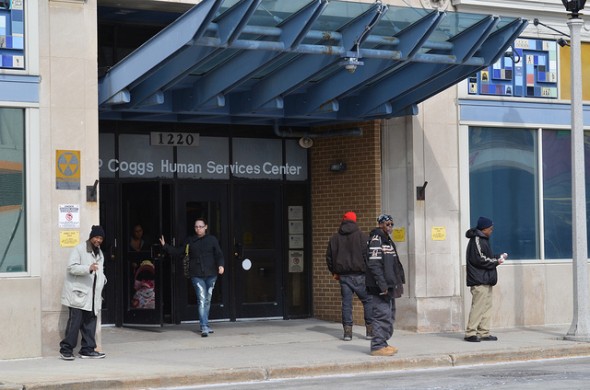Thousands Could Lose Food Stamps Under Walker Proposal
Job training requirements could mean more hunger in Milwaukee, advocate predicts.

Clients utilize the Marcia Coggs Center on 12th and Vliet. (Photo by Sue Vliet)
Thousands of Milwaukee residents living in poverty may be required to participate in a job-training program to receive food stamps if a proposal by Gov. Scott Walker is approved as part of the upcoming state budget.
In his 2013-15 biennial budget proposal, the Republican governor calls for FoodShare recipients who are able-bodied, not pregnant and not a parent of a child under 18 to participate in the FoodShare employment and training program.
Under Walker’s proposal, the state would use the federal Supplemental Nutritional Assistance Program eligibility guidelines. SNAP, which funds FoodShare, limits recipients who fail to participate in the job training program to three months of benefits every three years.
Sherrie Tussler, the executive director of the Hunger Task Force, is concerned that Walker’s proposal will ultimately create more hunger in the Milwaukee area.
“If people failed to participate and their cases were closed, that would mean they would become completely dependent on charity,” said Tussler, whose organization supplies all of the soup kitchens, homeless shelters and food pantries in Milwaukee County.
Tussler estimated about 27,000 FoodShare recipients in the Milwaukee area will be impacted. However, she noted that it is challenging to figure out exactly how many people would really be affected.
“The state of Wisconsin has refused to provide us with any other information other than to say that the program will be robust,” she said.
As he stood waiting for a bus near the Coggs Human Service Center, unemployed FoodShare recipient Gregory Jones, 54, said he opposes the proposal because the end result is still a low-paying job that is typically temporary. He’d prefer to find a full-time job on his own.
“You’ve got eat and you’ve got have housing. Getting food stamps is a good thing, but you got to have somewhere to cook the food,” said Jones, who gets $14 in food stamps a month.
Officials in the governor’s office were not available for comment.
Since 2008, Wisconsin has made the employment and training program voluntary. Walker’s proposal would require recipients to participate in a work program at least 20 hours a week, according to a Wisconsin Legislative Fiscal Bureau document published in January.
“My workforce development package provides a hand up to those who are able to work—not simply a hand out,” Walker said in a Feb.10 document in which he vowed to earmark $33 million to the employment and training program.
Daryl Wilson, a 41-year-old FoodShare recipient, doesn’t object to the program. “A person has got to want to help themselves,” said Wilson while standing outside of the Coggs Center.
“Some people just take advantage of this sh**,” said Wilson, referring to welfare programs.
This story was originally published by Milwaukee Neighborhood News Service, where you can find other stories reporting on fifteen city neighborhoods in Milwaukee.

















Gregory Jones gets $14/month on food stamps? He does not seem to dependent on the program, were you just looking for an opposing viewpoint to Daryl? Did you directly quote Gregory Jones or just miss a couple words?
Ugh.. Another attack on the poor that will just end up making more people hungry. I’m someone who has had a nearly full-time minimum wage job (in most minimum wage jobs it’s near impossible to get regular full-time hours) and had to live off FoodShare in the past. Most of the people I know who’ve received FoodShare or other benefits were in the same situation. The issue isn’t that people in Milwaukee are lazy, the issue is that- even for hard working, well-educated college grads like me- there just aren’t enough opportunities for decent jobs in this city.
If conservatives like Walker actually cared about the people all of their cuts are affecting, they would do things like raise the minimum wage so that we didn’t have a permanent underclass of working poor in Milwaukee and invest in things like education, transit, and quality of life that would attract better employers to Wisconsin and stem the state’s brain drain.
I was on food stamps when I attended high school. They’re certainly not enough to live on, and my mom and I were quite keen on changing our situation so we wouldn’t have to use them anymore. Luckily, we were able to, but many others aren’t so lucky.
Honestly, do $14-a-month food stamps, and welfare in general, really deserve to be called handouts? Or are they just penance of an extremely wealthy society too dysfunctional to make the necessary structural and systemic changes in order to eradicate poverty and gross inequality?
Sam, you state that people in Milwaukee are not lazy. I assume you mean the people now receiving food stamps. IF this is true, then there should be no issue at all with them participating in a program that is actually going to help them get a job. How could a job training program be considered a bad thing? What this program is now offering is free job training in addition to free food stamps. Looks like a win-win to me. I know a couple people in the Food Share program and they are gaming the system 100%. It does not mean that all people do but it also counters your contention that most people you know who are in it are hard working and can not find jobs etc.
Ben, first of all most people in the program are receiving a lot more then $14/month hand outs. Brenda O’Brien had an agenda with this article so she choose someone who gets a smaller hand out than average. What would you prefer we call them, gifts? freebies? Obamadollars>? The fact is, these people currently are getting something without providing anything in return. Dysfunction in a society would be to restrict people from lifting themselves out of this situation. Job training is one way we can do that.
A new documentary, American Winter, is a powerful indictment of the real suffering caused for children and their families by conservative “austerity” economic policies.
http://occupythebible.org/2013/03/19/suffer-the-little-children-jesus-denounces-child-hunger-in-america/
Chris Byhre, I do not disagree that job training is one of the ways we can combat poverty, however, it is doubtful that job training alone is a viable way of eliminating poverty. Did you read Bruce Murphy’s “The World According to Tim Sullivan?” In that article, Murphy does a good job debunking the “skills gap” myth. There is no skills gap, for the most part. Most people in poverty, including people on welfare, are in and out of the workforce. Employers are just unwilling to pay living wages to their workers, so if a disaster strikes, like a broken-down car or sickness, people cannot deal with their problems financially, thus they lose their jobs. Luckily, there is a large pool of unemployed people, so people like this can be easily replaced with more low-wage workers. Why don’t we force employers to pay living wages so that this doesn’t happen so easily and so that the people who are working honestly and diligently aren’t still in poverty?
When I read articles like this, I must ask myself a few important questions: Why is it that the proportion of the population in poverty has remained between ten and fifteen percent for over thirty years? Is it because there will always be a segment of the population that is too lazy to work itself out of poverty? Why is such a large segment of the population in poverty, when a much smaller segment, namely, the “top one percent,” owns 40% of the nation’s wealth? Could it be that 99% of the country is so much lazier than that one percent, or doesn’t work hard enough to earn a fairer share? Or could it be that this 1% of the population has learned how to “game the system,” to use your words, Chris Byhre, at the expense of everyone else?
I admit that there are people in poverty who “game the system,” as well. But what do they gain? Food? Shelter? I will make the contention that poor members of the richest society on the planet deserve food and shelter, so that they don’t die and are a bit less miserable as they carry on in this unlucky world. I am more concerned with reforming corporate welfare. What do the people who caused the financial crisis of 2008, many of whom belong to the top one percent, provide in return for their handouts? They shuffle around other people’s money and make nothing, except more money for themselves and a whole lot of trouble for everybody else. Corporate welfare has cost this country far more in both financial and moral capital than the kind of welfare discussed in this article, or what I would prefer to call the penitence of a dysfunctional and delusional society.
This topic seems pretty straight forward to me… if you’re able to work, then we should make getting a job or training for a job a requirement to get low income benefits. Daryl Wilson said it best when he said “some people just take advantage of this sh*#.” It makes it a lot harder for those who arn’t gaming the system, and affects how much society as a whole wishes to help those who are disadvantaged. Who loses? The people who are truly struggling to make ends meet and are putting the effort to better themselves.
We can debate the skills gap and corporate welfare all we want, but it doesn’t change that fact that it makes sense to require people to try to find work/education if they want benefits. Otherwise, if they can live the same lifestyle whether they’re working and contributing to society vs living off of the sytem, why would they ever try to do anything OTHER than living off the system?
@Chris, Andy:
My issue isn’t with offering training programs, which can be good for some people. When you apply for food stamps in this state you’re already directed towards resources for finding and applying for jobs. My issue is with making them mandatory, which ends up having the effect of making the system less accessible.
Andy, I mentioned the skills gap because job training programs, like the ones to which an applicant to food stamps would be directed under Governor Walker’s proposal, are meant to solve the problem of under-skilled workers, who are unable to take on skilled jobs, not being able to find employment. If the skills gap is non-existent or is not a significant cause of unemployment, however, then requiring those who are on food stamps to partake in a job training program, which is what Governor Walker’s proposal calls for, would largely be a waste of time and money. I referred to Bruce Murphy’s article because he demonstrates pretty clearly that the skills gap is virtually non-existent.
I mentioned corporate welfare because it seemed relevant to the broader concern of people taking advantage of government programs. It just seemed necessary to point out the irony in the governor’s proposal, which is that it fuels public outrage over people who “game the system” in order to get food so they don’t starve to death, when he has done next to nothing about other kinds of people who “game the system” in order to take tax-payer dollars to expand their profit margins.
Sam- I dont’ think asking someone to demonstrate that they are trying to change their situation as a condition of receiving benefits is asking too much. Offering something for nothing does little to motivate anyone.
Ben- Both of those points are valid concerns on their own. I can discuss how Bruce’s article is based off of very misleading information, or that he doesn’t understand manufacturing hiring practices… or I could agree regarding corporate welfare being just as big of a concern (after all, why should a few companies get breaks that the vast majority of other companeis don’t get?), but that would just get us off topic. 😉 Regardless of those arguments, I don’t think asking people to show effort in finding a job is too much to ask.
Aren’t there wealthy people that “game the system(s)” as well? And sometimes at a greater cost to the public?
Do two wrongs make a right? We should do our best to avoid as much “gaming of the sytem” as possible. Wouldn’t you agree?
This article was about a new initiative that was designed to assist people currently getting food stamps with finding a job and getting off food stamps. It won’t be long until one of the bleeding hearts who write for this site pens an article on corporate welfare, tax breaks for the wealthy etc etc and we can debate those subjects at that point. For now, this jobs training program will do two things at the very least. It will force people who really are gaming the system and have no intention of ever getting off the dole to expend energy and time actually looking for a job, or they can drop out of the program and lose their hand out. It also will help those hard working, down on their luck people who are in need of a boost to find employment and get their lives back on track. It’ s a win-win proposition.
If you ask me by passing this ridiculous Law they are increasing more people to become hungry and poor. People act like it is sooooo easy to find a job and some it takes soon as possible to some it takes longer. I feel like you can’t force people this is a ridiculous law and I can tell the outcome of this is not going to be good its going to anger and start problems
Taneisha, this law already passed and is set to take place April 1st. The whole point of this program is that it is not always easy to find a job and if you do not have children, you must join a program that helps you find a job (or trains you with skills to get a job). It may seem like a punishment to some… but ultimately it could be very beneficial to those who participate.